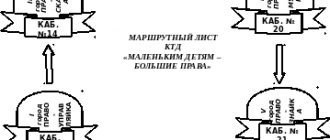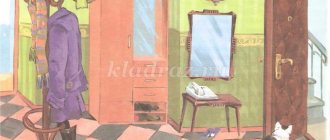conversation with children of the middle group “Children’s rights” lesson plan (secondary group)
MDOU "Kindergarten No. 55 combined type"
Summary of the conversation in the middle group
"Child's rights"
Prepared and conducted by: teacher of the highest qualification category Peskova Yu.D.
Saransk, 2020
Goal: Creating conditions for the child to develop initial legal knowledge.
Tasks.
Introduce children to the concept of “RIGHT”.
Explain that every person has the right to a name, to treatment, to rest, and the right to study.
Expand children's understanding of the variety of names.
To educate the moral and legal culture of children.
Preliminary work. Looking at family photographs, conversation: “Me and my name”, viewing the film “The Child Has the Right”. Materials used: Doll, ball of thread, magic flower, names of the child’s rights on the petals, cards with the interpretation of names.
Progress of the lesson.
Educator: Children, each of you, just like me, and all adults have rights and responsibilities. Today we will talk to you about our rights.
Guys, have you noticed that today a new doll has appeared in our group. The doll brought us a magic flower called “RIGHT”. Look, our rights are written on its petals.
The first petal is the right to a name.
Everyone has a different name: the Cat is Purr, the Dog is Barbos, even our goat
Their names are beautiful - Rozochka Nastya, Vika and Danila. They all have their own name.
We are now going to play the game “Chain of Names”. Children stand in a circle, pass a ball of thread to the accompaniment of slow music, and everyone says their name. At the end of the game the doll will cry.
Educator. What's happened? – The doll has no name. Guys, every person has the right to a name. Every adult and child has the right to a name, how can one live without a name? Maybe we can help and come up with a name for the doll? Children call names and choose one. For example, Lena. Educator: Well, there you go! Now you have a name, Lena. And each name has its own interpretation. The teacher reads the interpretation of their names to the children. Second petal – The right to rest.
Mom worked, Dad worked, and I was still in kindergarten. Everyone who is tired of hard work
They have every right to rest.
Every adult and child has the right to play and rest.
Warm-up “Pinocchio stretched”
Pinocchio stretched, Once, he bent down, Two, he bent down, Three, he bent over. He spread his arms to the sides, Apparently he couldn’t find the key. To get the key, we need to stand on our tiptoes.
The third petal is the right to study.
Educator. To grow up successful, you need to know and be able to do a lot. To grow big Not enough nutrition
We must use the Right to Education.
You and I learn a lot of new and interesting things every day.
Questions on the topic “Autumn” For consolidation.
Educator. Guys, the magic flower still has many petals, and every day we will look at it and learn about our rights.
Please tell us how you liked the Lena doll and her magic flower. What do you remember? What new did you learn? Children's answers.
Video clip for the song “Big Round Dance”.
Methodology
Legal education in kindergarten is carried out through joint actions of the child and the teacher and includes three components:
- information,
- practice under predetermined conditions
- independent activity.
This means that the organizer of a lesson with children first gives them information in an accessible form, taking into account the children’s life experience. Then a game situation is simulated in which the acquired knowledge can be applied. Next, the teacher must observe how children independently transfer new knowledge into practice, and, if necessary, adjust their actions.
Properly organized legal education in a preschool educational institution includes methods and types of work that are most suitable for each specific age group. Activities in the junior and senior groups of kindergarten should differ in content.
Junior and middle group
Activities related to the theme of family are suitable for kids. As a result, children will get an idea about the family, their role in it, and the love of parents and children. The lesson can include nursery rhymes and finger games.
Now many books have been published about parental love, about relationships with parents, the age audience of which is “1+”:
- “I want to go to my mother” D. Donaldson,
- “The Best Dad” by R. Guichu,
- “Whatever Happens” by D. Gliori,
- “The Tenderest Hugs in the World” S. Nash,
- “It’s Better at Home” by J. Langreuther,
- “Love you always and forever” E. Jonathan and many others.
Analyzing the plots of such works will help you understand the value of family. It would also be appropriate to have conversations about family well-being. These books are suitable for working with children of any age.
Senior and preparatory group
For older children, the most popular and widely used are role-playing and didactic games aimed at developing the ability to communicate, empathy, tolerance and the emotional sphere in general. As a result, the child sees how his actions look from the outside, what feelings he evokes in his classmates.
Conversations about famous fairy-tale characters and situations bring good results When working with fairy tales, the teacher must be especially careful. Often events in such works may be understood differently by children than by adults. It is necessary to put children in the place of the hero, asking questions about how he would behave, for example, if he caught a talking pike or goldfish.
It is imperative to conduct role-playing games that develop the ability for conflict-free communication and the ability to negotiate. You can act out situations related to resentment, anger, misunderstanding, joy, happiness, friendship. The main thing is that children learn the need for polite behavior and understand the characteristics of the manifestation of various emotions.
You can play games on the following topics:
- "One's own - someone else's"
- "I'm in another country"
- “Who should I help?” etc.
In addition to oral lessons, creative lessons . Drawing, creating postcards, posters, modeling, creating decorations - tasks are quite accessible for preschoolers.
Much attention should be paid to maintaining and strengthening the physical and psychological health of children of each age group.
Nurturing such personality qualities as legal consciousness and culture are the basis for the formation of a person’s legal competence.
The key to the formation of such a personality is the legal education of preschoolers, since it is at this age that character is formed and habits begin to be developed. After all, everyone knows that it is easier and more logical to teach correctly from the beginning than to reteach it later. And most importantly, this needs to be done on time.
Note
Currently, there are three international documents protecting children’s rights:
- Declaration of the Rights of the Child, adopted in 1959;
- UN Convention on the Rights of the Child, 1989;
- The World Declaration on the Survival, Protection and Development of Children came into force in 1990.
In Russia, the rights of the child are also set out in the following documents:
- Constitution of the Russian Federation;
- Law on Basic Guarantees of the Rights of the Child in the Russian Federation;
- Education Act;
- Family code;
- Legislation of the Russian Federation on protecting the health of citizens;
- Law on additional guarantees for the protection of orphans and children without parental care.
Basics
First, you need to determine what this type of education means?
In the most general understanding, legal culture and legal education of a person include actions and behavior in various, sometimes force majeure, circumstances.
It is legal culture that determines an individual’s ability to live in accordance with the moral and legal norms of society, communicate with people, and solve emerging problems.
The legal education of preschool children is rather preparatory and introductory in nature. Due to their age, preschoolers are capable of perceiving general information about their rights.
- The most important thing is to help the child learn to perceive himself as an individual with his own individuality and dignity. Self-esteem needs to be developed in children almost from birth. Every child has the right to be loved, to self-actualize and make choices.
- All children have the right to life, health, care, family, housing, and food. It is important to teach responsibility for yourself, your health, and compliance with safety measures.
- Every child has the right to education, development of his abilities, leisure, and freedom of speech. Only in this case will he grow up to be a self-sufficient person.
- Children have the right to protection from violence, cruelty, humiliation and coercion. This applies both to the family and to everyone who, for various reasons, is involved in raising the younger generation. According to the Family Code, the interests of children are a priority. No one has the right to harm their physical, mental, moral development.
- Preschoolers are already able to perceive the “I – other” relationship. Therefore, it is necessary to convey to them the idea that their rights are limited by the freedom of other children. It is also important to teach them tolerance, accepting other people’s choices, and peaceful conflict resolution. All people are different, and everyone has the right to be themselves. Children are quite capable of understanding and assimilating this simple idea.
Middle group. Junior preschool age. Children 4 - 5 years old
Summary of a complex thematic lesson in the middle group “About rights while playing” Purpose: To bring to the consciousness of children in an accessible form ideas about the rights of the child . Objectives: 1. Introduce children to their rights through fairy-tale characters and play activities; 2. Explain that every person has the right to a happy and peaceful life, the right to housing , the right ...
Lesson notes for the middle group “Child’s Rights”
Lesson summary: Topic: “ Children’s rights ”
Goal: To summarize children’s knowledge
about their civil rights and responsibilities . Objectives: to consolidate children’s basic knowledge about children’s rights ; -develop the ability to reason, compare and draw conclusions; -develop moral qualities...
Principles
Teachers and educators should rely on a number of principles:
- regularity, consistency and focus on specific results;
- taking into account age characteristics;
- in classes it is necessary to rely on the vital (life) experience of preschool children, since only in this case can children achieve understanding of the information;
- the involvement of parents and other people around the child in legal education is necessary in order to use a unified approach in this regard;
- an individual approach to each student, because everyone has different families, different experiences, and levels of development;
- creating a favorable psychological climate, a friendly atmosphere in the group; in a stressful atmosphere, the child will not be able to learn.





